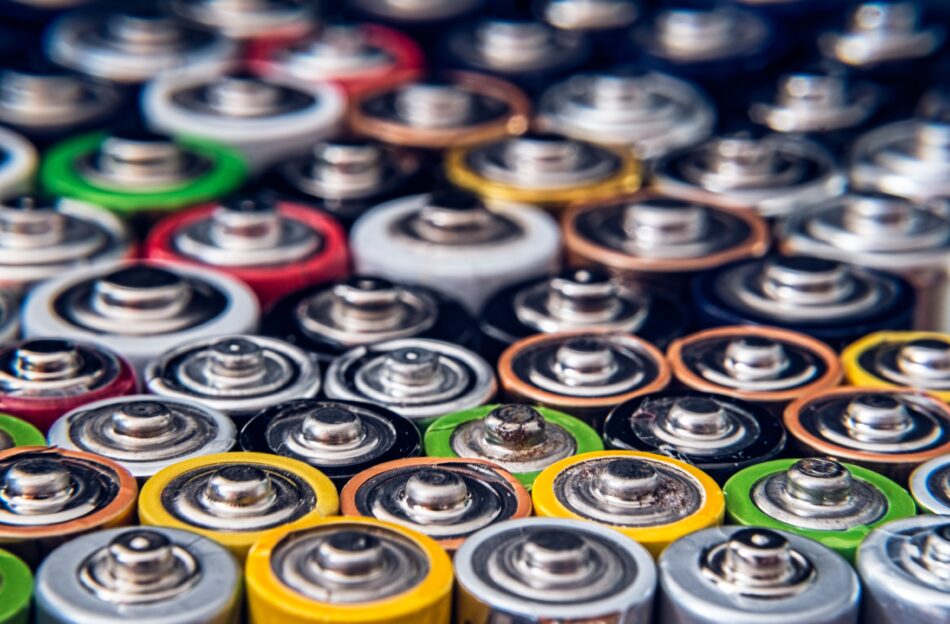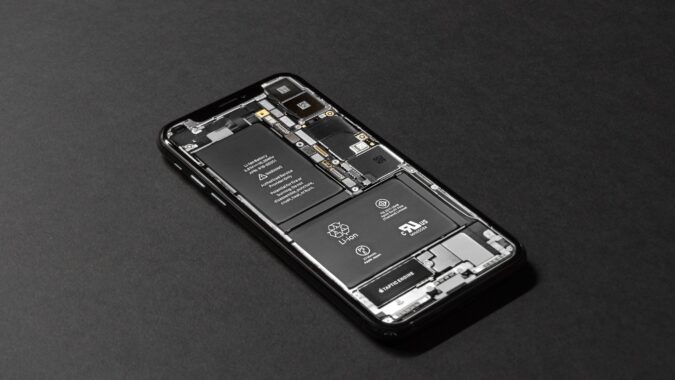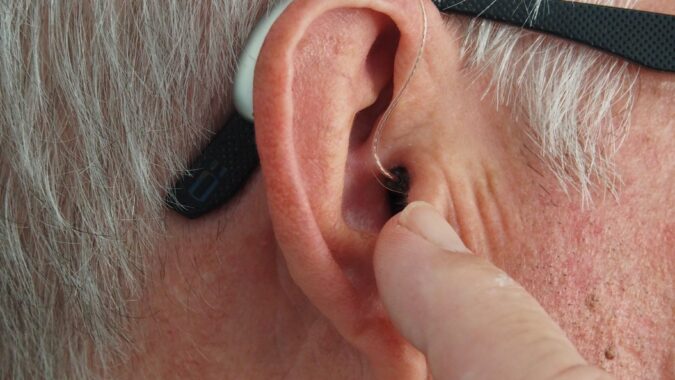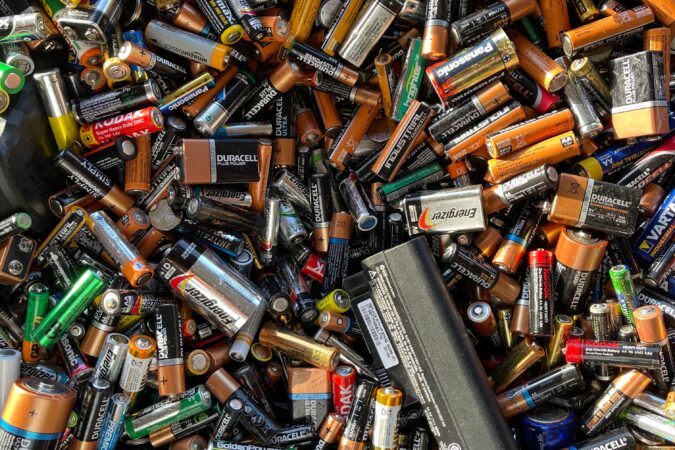How to Dispose of Batteries

How to Dispose of Batteries
Visit any large supermarket and they should have a battery recycling collection point to dispose of most household batteries. Alternatively, check if your local household recycling centre accepts old batteries. Businesses can dispose of batteries with collections by licensed waste carriers.
Batteries come in many shapes and sizes for a wide range of uses. They’re essential to keeping many businesses and homes running – powering our laptops, mobile phones, and many more devices. Safe and proper disposal is important when they run out to avoid old batteries ending up in landfill.
Batteries all do the same essential job of supplying portable power to a device but they’re not the same. They contain different materials depending on their type, size, and purpose, which means the right way to dispose of batteries properly varies. Discover how to dispose of old batteries based on their specific type in this guide.
Where to dispose
of batteries
Businesses in the UK that sell or supply more than 32kg of portable batteries each year must provide free collection (or takeback) of such used batteries. That’s the equivalent of selling about one four-pack of AA batteries a day. Therefore, most mid to large shops that sell batteries should offer a free collection point for old batteries.
There are three main places where you can dispose of batteries from your home or business:
- Supermarkets – pretty much any supermarket selling batteries should have a free battery recycling bin on-site. Here you can dispose of many battery types for recycling, even if you bought them elsewhere. These include disposing of AA and AAA batteries, 9v batteries, watch, camera, and electric toothbrush batteries.
- Recycling centres – lots of household waste recycling centres (HWRCs) also have battery bins for recycling. Check with your local authority to see if your nearest HWRC accepts old batteries. HWRCs are only suitable for domestic batteries, not used batteries from businesses.
- Commercial waste collections – businesses must arrange the removal of any batteries for disposal from their premises by a licensed waste carrier. The easiest and safest way to do this is by using a professional waste management company such as Business Waste to book collections. We can remove any type of old battery from your business and recycle it safely.
These places can accept most battery types, but you may wonder whether the old one you’ve got will be accepted. The battery type and condition affect the best way to dispose of it. Learn how to dispose of batteries in the UK based on their specific type.
How to dispose of
a lithium battery
Responsible lithium battery disposal is important as otherwise they can catch fire and explode. Lithium batteries are non-rechargeable, so when they run out they must be disposed of safely. Disposing of a lithium battery inappropriately may cause fires in landfill if they’re thrown away with general waste. They contain valuable materials that can be recycled, recovered, and reused such as cobalt, nickel, copper, and manganese.
The best way to dispose of a lithium battery is to return them to the original manufacturer. The manufacturer should arrange recycling, as lithium batteries are recyclable but only at certain treatment facilities. Alternatively, book battery collection with Business Waste and we can collect and transport lithium batteries from your premises to relevant recycling facilities.
To dispose of lithium-ion batteries you should follow the same processes. Lithium-ion batteries are rechargeable and often used in electric vehicles (including electric bikes and scooters), laptops, power banks, and garden tools. You should dispose of complete devices with WEEE recycling. If the lithium-ion battery is removed you can recycle it separately.
How to dispose of
leaking batteries
When batteries get old they may start to corrode and leak materials including mercury, lead, and cadmium. These are hazardous materials that can be harmful to human health and the environment. You can still dispose of leaking batteries but must take an extra step to do so safely and carefully.
To dispose of leaky batteries, you should first put them in a clear plastic bag and seal it to prevent anyone from coming into direct contact with these hazardous materials. Then you can dispose of the leaking batteries the same as any old batteries – in a battery recycling bin at a supermarket, recycling centre, or via collection.
How to dispose of
phone batteries
You can dispose of mobile phone batteries in a dedicated battery bin at any shop or supermarket. Remove the old battery from your phone when it’s dead and drop it in the bin for recycling, following any instructions. Some recycling centres also accept used phone batteries with their battery bins.
If the battery is from a work phone, then it classes as commercial waste. In this case, it should be disposed of with your other commercial battery waste collections. If you can’t remove the battery from the phone, then you can dispose of the entire device with commercial WEEE recycling.

How to dispose of
laptop batteries
With any laptops for personal use, you can dispose of their old batteries in a battery recycling bin found in most medium and large shops that sell batteries. First, you must remove the battery from your laptop and ensure it’s free from all of the casing. Some HWRCs also accept old laptop batteries for recycling.
Any work laptops and their batteries class as commercial waste. If the laptop battery is removed, then it can be stored in your business’ battery bins and collected by licensed waste carriers alongside any other batteries for disposal. You can also send laptops for recycling in one piece with WEEE recycling collections.
The old laptop will be transported to an Approved Authorised Treatment Facility. Here it’s disassembled and the different materials are sent for recycling and disposal in their separate streams. This can include parts sent for hazardous waste disposal, as well as metal and plastic recycling.
How to dispose of
vape batteries
Batteries from single-use, rechargeable, and rechargeable vapes with a single-use chamber should all be recycled. If you can remove the battery from the vape then you can recycle it alongside other portable batteries in a battery recycling bin found in supermarkets or any shops that sell batteries.
For any vapes with a built-in battery, you should recycle the whole device with WEEE recycling. Many retailers also take back old vapes when you buy a new one, while certain big shops will accept your old vape even if you’re not buying anything. They’ll then ensure the vape battery is recycled safely.
How to dispose of
hearing aid batteries
When hearing aid batteries run out you can remove them and drop them off at a nearby battery recycling point in supermarkets and other large shops. This includes any rechargeable hearing aid batteries, as they class as portable sealed batteries.
If you’re getting rid of the full hearing aid, then it’s best to take it back to the supplier – whether it’s simply unwanted or faulty. Doctors’ surgeries, hearing specialists, and some charity shops also have collection points. They should replace the batteries if they no longer work before distributing them to any hard-of-hearing people in their network.
Any businesses that take back old hearing aid batteries should then arrange commercial battery collection. If your organisation accepts complete hearing aids, then you’ll need to dispose of them with commercial WEEE recycling collections.

How to dispose of
rechargeable batteries
You can dispose of small rechargeable batteries – including those from mobile phones, laptops, and digital cameras – in the same way as regular batteries. Take them to a battery recycling point offered by many retailers or to your nearest HWRC. Rechargeable batteries can contain nickel, mercury, lead, and cadmium, which are hazardous, so never throw them away with general waste.
As a business you should dispose of rechargeable batteries alongside the rest of your commercial battery collections. Due to their nature, they can class as hazardous waste but recycling with regular batteries is easiest. Any devices that contain a rechargeable battery you can’t remove should be disposed of intact alongside WEEE recycling.
Arrange battery disposal
from your business
If your business has any old batteries to dispose of – whatever their type, size, and amount – you must arrange commercial waste collection. We can provide free bins in many sizes to store batteries safely on-site before removal. Our licensed waste carriers will then collect them at an agreed time and date.
Get a free quote for commercial battery collections wherever your business is in the UK. You can organise collections as a one-off or on a daily, weekly, or fortnightly schedule. After removal, we’ll transport them to a nearby waste management facility for recycling and provide you with a free duty of care certificate for peace of mind.
Contact us online or call 0800 211 8390 for your free quote and start recycling batteries from your business today.
Learn more about
battery disposal
How to recycle batteries – FAQs
-
Why you should I recycle old batteries?
Batteries are a common form of business waste – from dry cell batteries that power torches, radios, and TV controllers, to powerful lithium-ion cells used in laptops, mobile phones, and cars. Commercial battery waste can cause extreme damage to the environment and pose a danger to both wildlife and people.
Electronic devices are more important and prevalent than ever in the workplace. Reliance on these devices creates a steady flow of used batteries or batteries that need replacing more often thanks to high usage.
However, the components found inside most batteries are major pollutants. Elements like mercury and cadmium can cause damage if the leak into the food chain. Thousands of new batteries enter the UK every year, but sadly lots end up in general waste bins.
Recycling batteries avoids your business contributing to landfill, which can cause pollution due to chemicals leaking out of old batteries buried underground. This helps your company have a more positive impact on the planet and uphold your corporate responsibilities.
-
How do you recycle lead acid batteries?
Lead acid batteries are often used in cars. To recycle lead acid batteries, the battery is broken down and then neutralised in acid. Once neutralised, both lead and polypropylene are recovered. These materials can be used to make new lead acid batteries or to create battery casing.
-
How are batteries legally disposed of?
As well as taking your used batteries away, Business Waste complies fully with government legislation to ensure the correct battery disposal and handling of the dangerous elements they commonly contain. You can easily get rid of old and dangerous batteries properly with peace of mind that they’ll be recycled at our facilities and stored safely, within the strict parameters that prevent them from damaging the environment.
-
What legislation and laws govern battery recycling and disposal?
Businesses must comply with various government legislations when disposing potentially dangerous elements, such as the chemicals found in batteries. These legislations are in place to protect your own safety and the environment.
The most prominent laws associated with battery disposal are the Batteries and Accumulators Regulations 2008 and the Waste Batteries and Accumulators Regulations 2009. To follow these legislations, your business must:
- Ensure that any used or produced batteries are disposed of safely.
- If producing a product that uses batteries, the user must be able to remove the battery easily.
- The batteries used must contain less than the maximum prescribed levels of prohibited elements (mercury, cadmium, and lead).
- Batteries must display the ‘crossed-out wheeled bin’ diagram, alongside any relevant chemical symbols.
-
What are the waste codes for batteries?
In accordance with UK law, you must classify your waste before it’s collected and taken to a recycling facility. Therefore, different waste items have different waste classification codes. These provide information on how hazardous the material is, or the elements that it contains. Some examples of battery waste codes include:
- Lead Batteries
Waste Code: 16 06 01
Classification: Hazardous - Mercury-based batteries
Waste code: 16 06 03
Classification: Hazardous - Alkaline batteries
Waste code: 16 06 04
Classification: Non-hazardous
- Lead Batteries
-
How do you get a battery recycling bin?
It’s quick and simple to get a free battery recycling bin. Plus, one of our expert team members will arrange for used battery collections that suit your requirements and ensure a minimum number of used batteries are stored at your premises at any one time.
Contact us today, fill in our online form or call 0800 211 8390 for a fast and free quote. We’re also on hand to help with any questions or suggestions when it comes to arranging commercial battery disposal, or if you want to learn more about how we deal with used batteries.
-
How do I dispose of batteries near me?
When you need old battery disposal for your business, get in touch with Business Waste for a quick and free quote. We cover all the country to offer battery disposal anywhere in the UK. If you’ve got old batteries to get rid of at home, you can find battery disposal near you at a local recycling plant.
-
What happens if you touch a leaking battery?
Battery acid or leakage can seep out of old, used batteries. What happens if you touch it depends on the type of battery that’s leaking. The chemicals release may burn your skin if you touch it, while it can also contaminate soil and ruin the device it’s in.
-
Can you put AA batteries in the bin in the UK?
You should not put AA batteries in the bin. Instead, separate AA batteries and place them in a battery recycling box just for alkaline batteries. You can then arrange collection, so they’re recycled and turned into new products. You should also not dispose of electrical items that use AA batteries. Instead, get rid of them as part of your electrical waste.
-
How do you dispose of used batteries?
The easiest way to dispose of used batteries from your household is to find your nearest battery bin. Many supermarkets, electronic retailers, and other shops have battery recycling bins where you can recycle used batteries including AA and mobile phone batteries. Most household waste recycling centres also accept used domestic batteries for recycling.
For used battery disposal from a business you must arrange commercial waste collection. This applies for all used batteries your organisation produces, from a handful of waste AAA batteries to many dead car batteries from a garage. Companies such as Business Waste provide free bins to store them before arranging collection and used battery disposal.
Contact us for a free quote for used battery disposal.
Get your free battery disposal quote
Get a fast FREE quote for battery recycling collections
- Free quote within 1 hr
- Any type of battery waste
- FREE bins and delivery
- We cover all of the UK
Have your waste collected
Get a fast FREE quote for your waste collection 0800 211 83 90
- Free quote within 1 hr
- Any type of waste
- FREE bins and delivery
- We cover all of the UK
